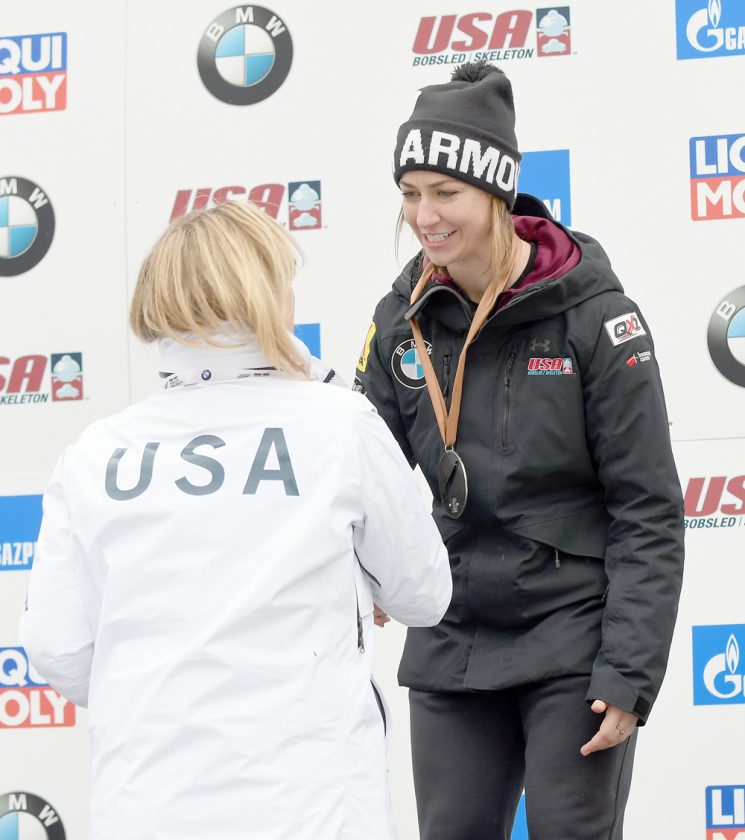Wesenberg puts an end to two-year US skeleton medal drought

Kendall Wesenberg begins her second run in the women’s World Cup skeleton race at Mount Van Hoevenberg. (Enterprise photo — Lou Reuter)
LAKE PLACID — A medal drought that lasted for more than two years for the United States on the World Cup skeleton tour ended Friday, thanks to Kendall Wesenberg.
At the next-to-last World Cup stop of the season, Wesenberg captured the bronze medal in the two-heat women’s skeleton race at Mount Van Hoevenberg in Lake Placid.
Wesenberg, a 28-year-old from Modesto, California, came through with a consistent performance, turning in the third-fastest times on each run to claim the first World Cup medal for the U.S. skeleton team since Matt Antione slid to a silver on the same track in December 2016.
Wesenberg put down runs of 55.15 and 55.95 seconds to finish with a third-place combined time of 1:51.10. The only racers she trailed at the end of the race were Russia’s Elena Nikitina and Germany’s Jacqueline Loelling, who both earned gold medals after finishing in a rare tie for first place. The two winners both turned in 1:50.59 totals.
Nikitina retained her rank at the top of the women’s World Cup standings by winning for the third time in seven races. Loelling remained in second place after winning for the second time this season.

Kendall Wesenberg receives her skeleton bronze medal in Lake Placid from United States Olympic Committee CEO Sarah Hirshland. (Enterprise photo — Lou Reuter)
Although it wasn’t a victory on her home track, Wesenberg was thrilled with the result while earning the second World Cup medal of her career. Her best finish this season prior to Friday was a seventh-place effort in the tour’s last stop on Jan. 25 in St. Mortiz, Switzerland.
“It feels like things are on the right page right now. Things are trending in the right direction,” Wesenberg said. “Obviously, there are always things I can clean up, but it’s continually getting better every week. I feel good about it.
“We came in here with a different mentality to just relearn the track, take it turn by turn and I think it paid off,” she added. “This track’s really fun. It’s very different than everything else we race on, so it’s obviously a home track advantage. It’s quick, and you just have to be in the zone in all 19 corners.”
The first run of the women’s race turned out to be the fastest for all 16 competitors in the field representing eight nations. Wesenberg’s opening run was less than a quarter second behind Nikitina, who set the pace in the first heat with a time of 54.87 seconds. Although Wesenberg’s start times were back in the pack — 10th on the first run and 13th on the second — she was able to gain speed during each run to reach the podium.
“I slid well on the first run, I slid all right on the second run,” she said. “I knew kind of halfway down the track that I needed to make up some time. I wasn’t in a great spot coming into (Curve) 10. I kind of felt that I didn’t have a clean top but I knew my best chance was to just carry speed at the bottom and try to make up some time there, and it worked out.
“Bronze, it’s awesome,” Wesenberg added. “World Cup medals are hard to come by. There’s eight races a year and three medals in each of those, so to get one is great, and hopefully, it keeps trending this way.”
Savannah Graybill was the other American athlete in the women’s skeleton race. She turned in the 10th and 13th fastest runs to finish 12th with a 1:52.02 combined time, which was 1.47 seconds behind the winning result.
Canada’s Mirela Rahneva finished fourth and Germany’s Sophia Griebel placed fifth to round out the top five.
There are two more World Cup skeleton races remaining in the season, both next weekend in Calgary. The season then ends in Whistler, British Columbia at the 2019 IBSF World Championships.
“Last year was my first time in Calgary at team trials during an Olympic year, so that was pretty intense but it went all right,” Wesenberg said. “Whistler, I really started to get the hang of earlier this year. It’s good. It should be fun. It’s all about putting it together. It’s a puzzle every week. You try to figure out how to put together all those turns successfully while building speed. It’s like a fun little puzzle; a fast one.”



